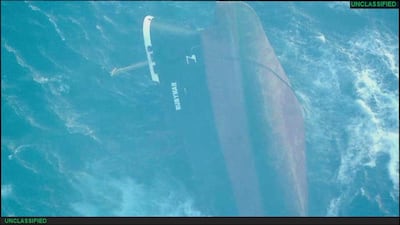Live updates: Follow the latest news on Israel-Gaza
The US military has condemned Yemen’s Houthi rebels over the sinking of the UK-owned Rubymar ship.
It warned of environmental hazards it poses, echoing the Yemeni government's concerns that the vessel's cargo of hazardous fertiliser are a risk to marine life.
The Rubymar sank in the southern Red Sea in the early hours of Saturday morning. It is the first vessel lost since the Houthis began targeting commercial ships in November.
“The approximately 21,000 metric tonnes of ammonium phosphate sulphate fertiliser that the vessel was carrying presents an environmental risk in the Red Sea,” the US military said.
“As the ship sinks it also presents a subsurface impact risk to other ships transiting the busy shipping lanes of the waterway. The Iran-backed Houthis pose a heightened threat to global maritime activities.”
The area is home to a delicate aquatic ecosystem with coral reefs as far south as the Bab Al Mandeb.
“Essentially, a fertiliser spill would cause a rapid nutrient increase, which means it gives a lot of food or nutrition for algae to bloom rapidly and this will disrupt the balance of marine ecosystems,” Sammy Kayed, an environmental expert who has worked with the UN, told The National last week.
The UK-owned ship attacked by Houthi militants two weeks ago sank in the Red Sea, the US military confirmed on Saturday.
Ahmed Awad bin Mubarak, Yemen's Foreign Minister in Aden, said: “The sinking of the Rubymar is an environmental catastrophe that Yemen and the region have never experienced before.
“It is a new tragedy for our country and our people. Every day we pay the price for the adventures of the Houthi militia.”
The marine science department at the University of Jordan said the release of large amounts of fertiliser could stimulate excessive growth of algae, using up oxygen that would kill regular marine life.
The ship was in the Gulf of Aden near the Bab Al Mandeb when it was hit by two missiles fired by Yemen-based Houthi rebels last month.
Iran-aligned Houthi forces began drone and missile attacks in mid-November against international commercial ships in the Red Sea and the Bab Al Mandeb – a route that accounts for about 12 per cent of the world's shipping traffic.
Houthis' drone and missile assaults have forced shipping firms to divert ships to the longer route around southern Africa, disrupting global trade by delaying deliveries and sending costs higher.
The militia has vowed to continue its attacks as long as Israel continues to commit “crimes” against Palestinians.
In a post on X, a Houthi leader, Mohammed Ali al-Houthi, said British Prime Minister Rishi Sunak and the UK government “had a chance to recover the Rubymar by allowing aid lorries into Gaza”.
The US and its allies have not been able to deter further attacks by the Iran-backed group despite the formation of a naval coalition involving at least seven countries and several joint US-UK air strikes on Houthi targets in Yemen.
The EU has launched a separate defensive naval mission in the Red Sea, saying it does not plan to participate in the US-led attacks on Houthis on Yemeni soil.

